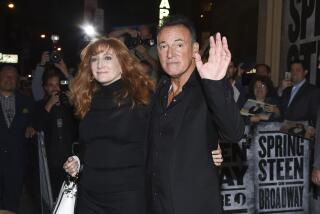POP MUSIC REVIEW : Springsteen’s Former Sideman Performs With Note of Sadness
- Share via
SAN JUAN CAPISTRANO — “I’ve been real sad lately,” Clarence Clemons confided to a packed Coach House on Saturday, and who wouldn’t be if their boss of the last 17 or so years gave them the heave-ho a few weeks before Christmas?
Here the tenor sax tornado and his fellow E-Streeters had devoted themselves to consistently being one of the world’s great bands for Bruce Springsteen, through thick and thin, and now with the holidays upon them they’re faced with having to think about sending their resumes off to John Cafferty.
Clemons felt compelled to mention the split-up several times during the show, speaking with sadness and confusion over having to relinquish his role as the Boss’s right-hand man, and several of his show’s moments had a Springsteenian bent to them. But he also talked about his enduring friendship with Springsteen, the need to move on, and the compelling power of love.
At its best moments, Clemons’ music reflected those latter sentiments. But more often than that, the show was standard bar-band fare, with no sense of vision to it.
Fortunately, Clemons has largely abandoned the mechanical dance sound of his current “A Night With Mr. C.” album, in which the Narada Michael Walden production makes even “Twistin’ the Night Away” sound like a Whitney Houston track. Saturday’s music rocked a lot closer to the roots of things. Less fortunately, Clemons’ five-piece group of Northern Californians usually played with little more feeling and finesse than the average bar band, though with a good deal more grandstanding and posturing.
Mixing between originals and a predictable bag of oldies, including the aforementioned twistin’ Sam Cooke tune, a clumsily rapped-up “Quarter to Three” and “Nadine,” the band often seemed leaderless, as even Clemons’ lead vocals seemed peripheral to a center that wasn’t there.
Meanwhile, along with his several mentions of “that fellow who used to dance to the left of me,” Clemons also performed the Springsteen staples “Paradise by the C” and “Glory Days” (its lyric--”glory days, they’ll pass you by”--had to be a bit haunting to a man who until recently was part of a world-spanning, stadium-filling whirlwind). Other Boss-toned moments included Clemons’ dancing on the tables, dancing with a girl in the audience, and doing a long Bruce-like story intro to King Curtis’ “Soul Serenade.”
Though it devolved into a band show-off tune, the Curtis instrumental was one of the few selections that gave Clemons something worth pouring his soul into. A number of rock sax players--including Curtis, Junior Walker and Earl Bostic--had a more developed personal style and skill on their instrument, but Clemons’ strongest point is the controlled power of his tone. When sufficiently moved, he can pour such an emotional torrent of tone into one note that no further ornamentation is necessary.
The moments when such emotion emerged were few--coming chiefly on “Temptation,” a burning R&B; number, and Clemons’ hit duet with Jackson Browne, “You’re a Friend of Mine.” But they made the evening worthwhile. Tipping the scales solidly to the plus side was an instrumental in which, backed only by keyboards, Clemons’ horn brought dimension to his preamble about love and friendship. While not likely to displace Coltrane, his extended solo was a gem of reflection and harmony.
More to Read
The biggest entertainment stories
Get our big stories about Hollywood, film, television, music, arts, culture and more right in your inbox as soon as they publish.
You may occasionally receive promotional content from the Los Angeles Times.










